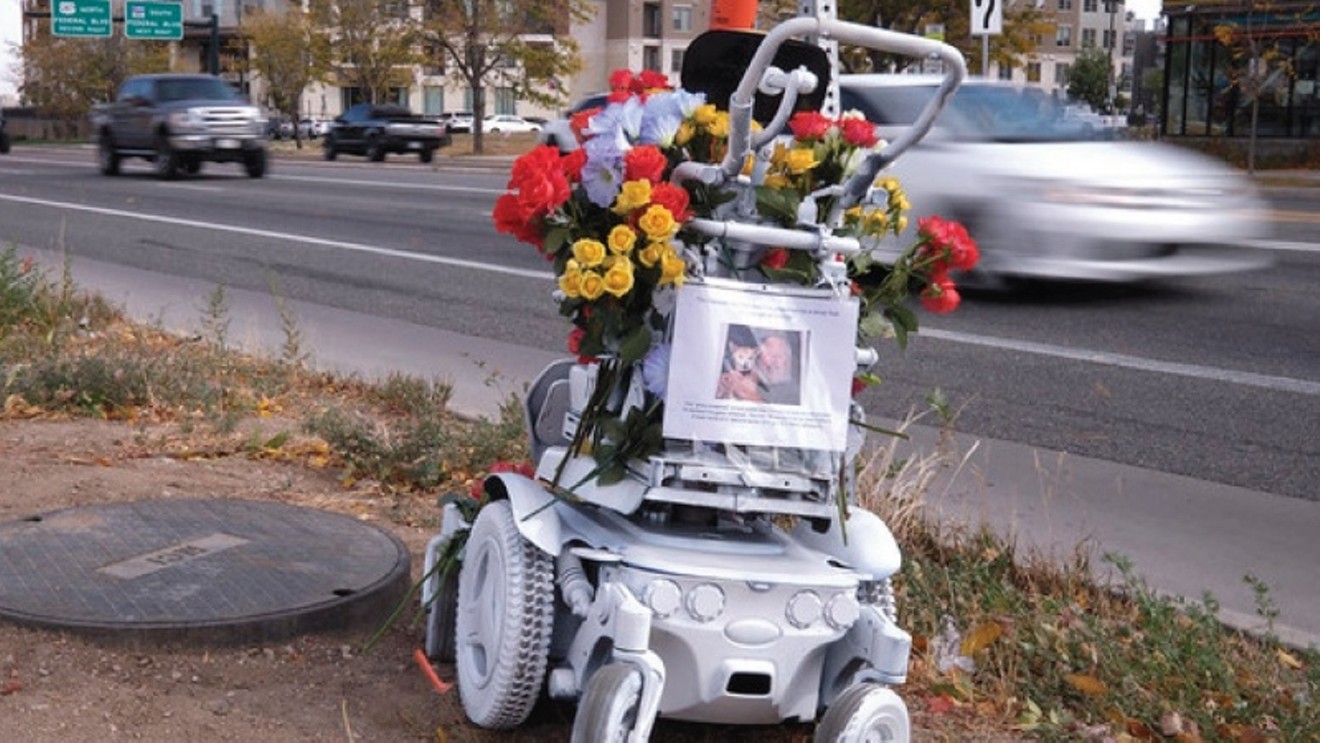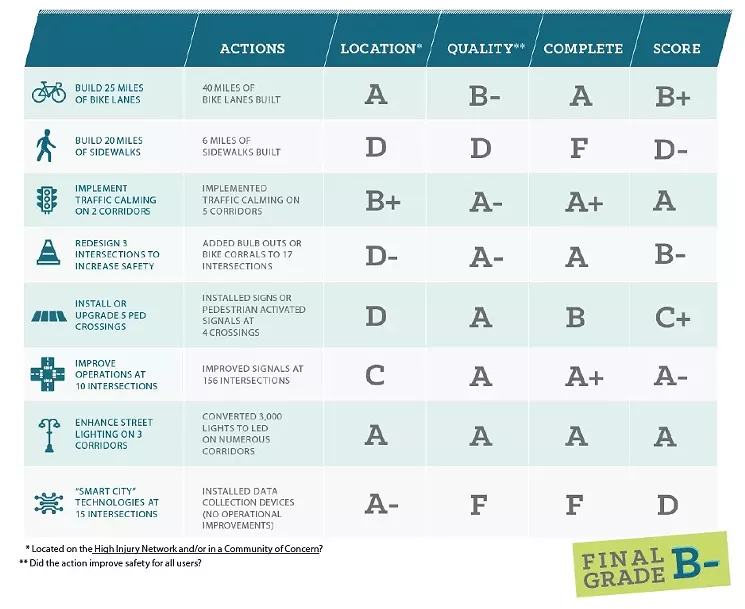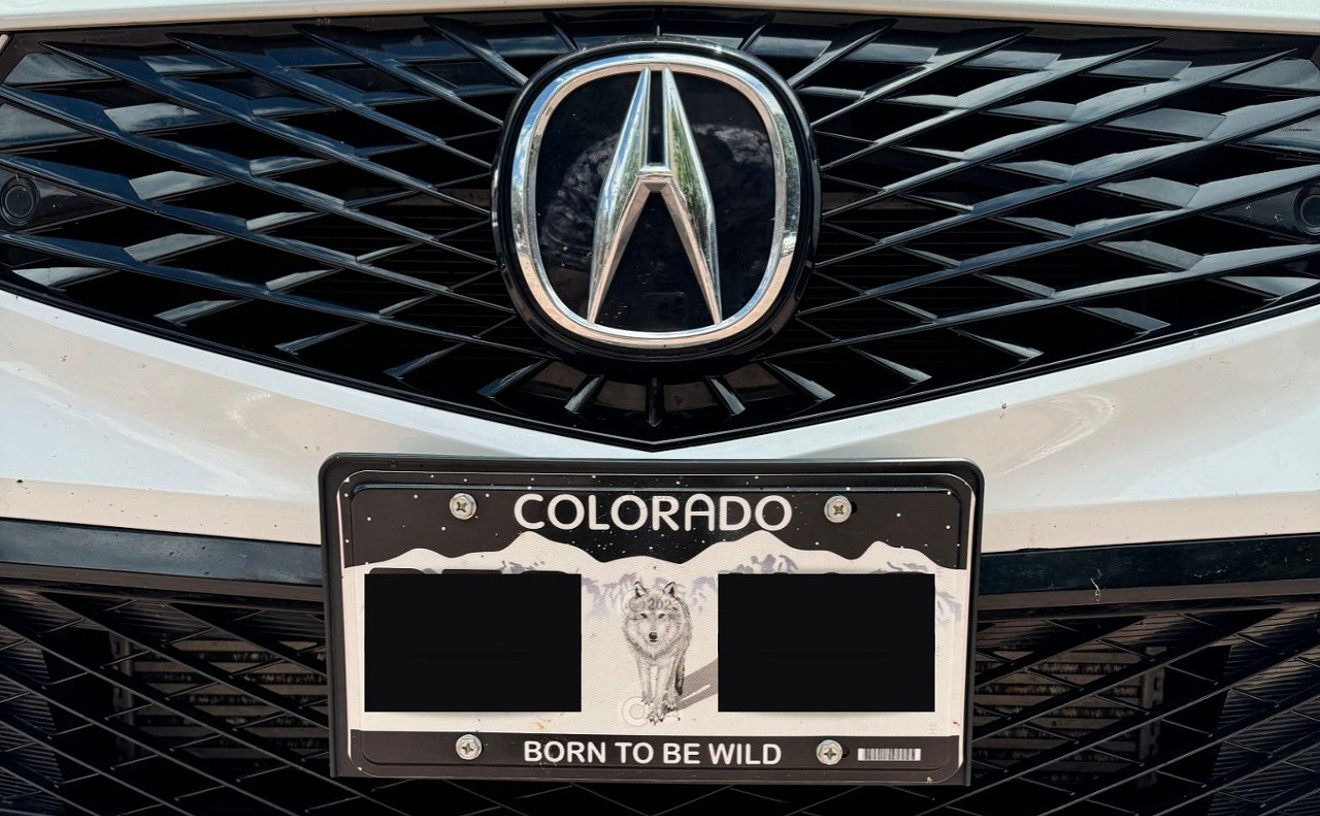Denver Streets Partnership just issued its report card on the City of Denver's 2020 update on Vision Zero, a five-year action plan launched in 2017 with the self-described goal of "eliminating traffic deaths and serious injuries by making our roadways safer for everyone." And while the city earned plenty of high marks in specific areas, it received a mediocre B- overall.
Its worst performances related to its failure to build twenty miles of sidewalks (only six miles' worth were completed) and the unmet objective of installing so-called "Smart City" technology at fifteen intersections (data collection devices were put in place, but the organization maintains that there have been "no operational improvements"). Among the pluses, lauded in a preview of the report last month by Denver Streets Partnership director Jill Locantore, were the city's efforts to increase safety on two of the city's most heavily traveled routes, East Colfax Avenue and Santa Fe Drive, which she says was put on a "full road diet."
But there's also this damning statement related to the deaths of 57 people in traffic accidents during 2020, when volume was lower than usual owing to the COVID-19 pandemic: "Despite the city's improvement in their grades over time, traffic fatalities are not decreasing fast enough to hit the goal of zero fatalities by 2030."
Here's a graphic showing Denver's grades in eight categories, as measured by location, quality and completion.
The sidewalk situation was particularly troubling for Locantore.
"Yet again, the city is failing to meet its own goals for building out the sidewalk network," she says. "When the plan was adopted in 2017, they set numeric targets for each year. But they're still building sidewalks at the same snail's pace and falling even further behind their own goals, which is really disappointing. They can't seem to figure out how to pick up the pace and stay true to their own commitments around sidewalks."
As for pedestrian crossings and intersection redesigns, Locantore acknowledges that "the projects they're doing are good, quality projects. But there still aren't enough of them located on the high-injury networks — the 5 percent of streets where 50 percent of the fatalities are happening." (See our recent post about Denver's most dangerous streets for more details.)
"The action plan says we should prioritize improvements on those streets because they're the most dangerous," she continues. "But those are also the bigger streets with higher volumes of traffic, and that makes them a bigger challenge. So we can understand why they started on some of the easier streets. But three years later, it's still frustrating that they're not doing as much on the high-injury network."
Still, Locantore lauds what she sees as "some shining bright spots, like exceeding their goal of building out bike lanes in 2020. The city built forty miles of new bike lanes, which far exceeds any previous year, and that's great, because so many more people were cycling during the pandemic and plan to continue doing so. That underscores the value of providing safe infrastructure for people on bikes."
Another pandemic-related data point: Locantore notes that during April 2020, when shutdown orders were in place, "We had zero traffic fatalities — and since we've been tracking this, we've never seen a whole month go by without a fatality. But with 57 fatalities last year, that's still more than one a week. That says to me that if we can give people alternatives to driving and reduce the number of cars on our streets, it will go a long way toward reducing traffic fatalities."
Click to read the Denver 2020 Vision Zero report card.
[
{
"name": "Air - MediumRectangle - Inline Content - Mobile Display Size",
"component": "12017618",
"insertPoint": "2",
"requiredCountToDisplay": "2",
"watchElement": ".fdn-content-body",
"astAdList": [
{
"adType": "rectangle",
"displayTargets": "mobile"
}
]
},{
"name": "Editor Picks",
"component": "17242653",
"insertPoint": "4",
"requiredCountToDisplay": "1",
"watchElement": ".fdn-content-body",
"astAdList": [
{
"adType": "rectangle",
"displayTargets": "desktop|tablet"
},{
"adType": "rectangle",
"displayTargets": "desktop|tablet|mobile"
}
]
},{
"name": "Inline Links",
"component": "18838239",
"insertPoint": "8th",
"startingPoint": 8,
"requiredCountToDisplay": "7",
"maxInsertions": 25
},{
"name": "Air - MediumRectangle - Combo - Inline Content",
"component": "17261320",
"insertPoint": "8th",
"startingPoint": 8,
"requiredCountToDisplay": "7",
"maxInsertions": 25,
"watchElement": ".fdn-content-body",
"astAdList": [
{
"adType": "rectangle",
"displayTargets": "desktop|tablet"
},{
"adType": "rectangle",
"displayTargets": "desktop|tablet|mobile"
}
]
},{
"name": "Inline Links",
"component": "18838239",
"insertPoint": "8th",
"startingPoint": 12,
"requiredCountToDisplay": "11",
"maxInsertions": 25
},{
"name": "Air - Leaderboard Tower - Combo - Inline Content",
"component": "17261321",
"insertPoint": "8th",
"startingPoint": 12,
"requiredCountToDisplay": "11",
"maxInsertions": 25,
"watchElement": ".fdn-content-body",
"astAdList": [
{
"adType": "leaderboardInlineContent",
"displayTargets": "desktop|tablet"
},{
"adType": "tower",
"displayTargets": "mobile"
}
]
}
]













